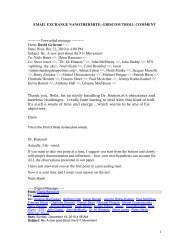court of appeal for ontario - academicfreedom.ca
court of appeal for ontario - academicfreedom.ca
court of appeal for ontario - academicfreedom.ca
Create successful ePaper yourself
Turn your PDF publications into a flip-book with our unique Google optimized e-Paper software.
constitute an improper motive or <strong>of</strong>ficious intermeddling <strong>for</strong> purposes <strong>of</strong> the law <strong>of</strong><br />
champerty.<br />
[73] I am com<strong>for</strong>table that this conclusion is consistent with the reasonable evolution<br />
<strong>of</strong> the common law in this area <strong>of</strong> the law. Some <strong>court</strong>s already have reached similar<br />
conclusions.<br />
[74] Further, the proposed change is not made in a vacuum. The effects <strong>of</strong> permitting<br />
contingency fee agreements have been thoroughly studied in Ontario and the experiences<br />
<strong>of</strong> the many jurisdictions that permit such agreements are well documented. As a result,<br />
this <strong>court</strong> has the benefit <strong>of</strong> a very broad base <strong>of</strong> in<strong>for</strong>mation in assessing the potential<br />
advantages or disadvantages in developing the common law along the lines I propose.<br />
Moreover, be<strong>ca</strong>use the issues surrounding contingency fee agreements relate to the<br />
administration <strong>of</strong> justice, a <strong>court</strong> is in as good a position as anyone to assess the<br />
ramifi<strong>ca</strong>tions <strong>of</strong> an evolution <strong>of</strong> the law in this area.<br />
[75] To be clear, I am not suggesting that contingency fee agreements <strong>ca</strong>n never be<br />
champertous. Rather, I conclude only that contingency fee agreements should no longer<br />
be considered per se champertous. The issue <strong>of</strong> whether a particular agreement is<br />
champertous will depend on the appli<strong>ca</strong>tion <strong>of</strong> the common law elements <strong>of</strong> champerty to<br />
the circumstances <strong>of</strong> each <strong>ca</strong>se. A <strong>court</strong> confronted with an issue <strong>of</strong> champerty must look<br />
at the conduct <strong>of</strong> the parties involved, together with the propriety <strong>of</strong> the motive <strong>of</strong> an<br />
alleged champertor in order to determine if the requirements <strong>for</strong> champerty are present.<br />
[76] When considering the propriety <strong>of</strong> the motive <strong>of</strong> a lawyer who enters into a<br />
contingency fee agreement, a <strong>court</strong> will be concerned with the nature and the amount <strong>of</strong><br />
the fees to be paid to the lawyer in the event <strong>of</strong> success. One <strong>of</strong> the originating policies in<br />
<strong>for</strong>ming the common law <strong>of</strong> champerty was the protection <strong>of</strong> vulnerable litigants. A fee<br />
agreement that so over-compensates a lawyer such that it is unreasonable or unfair to the<br />
client is an agreement with an improper purpose – i.e., taking advantage <strong>of</strong> the client.<br />
See Thai Trading, supra, at 788, 790. The appli<strong>ca</strong>tions judge in this <strong>ca</strong>se dealt with this<br />
concern as follows, at 157:<br />
The suggested compensation may or may not be fair and reasonable, depending upon the<br />
outcome <strong>of</strong> the litigation in light <strong>of</strong> the difficulty <strong>of</strong> the <strong>ca</strong>se, as well as the time and<br />
expenses incurred. Counsel should be well rewarded if the litigation is successful, <strong>for</strong><br />
assuming the risk and costs <strong>of</strong> the litigation. The compensation however should not be a<br />
windfall resembling a lottery win.<br />
[77] I agree with these comments.<br />
(c)(e) Appli<strong>ca</strong>tion <strong>of</strong> the law to this <strong>ca</strong>se<br />
[78] The appli<strong>ca</strong>tions judge granted a declaration that the proposed fee agreement does<br />
not violate the Champerty Act. The proposed agreement provides <strong>for</strong> payment to the<br />
respondent’s lawyers <strong>of</strong> a fee in the amount <strong>of</strong> 30 percent <strong>of</strong> compensatory damages<br />
recovered, 40 percent <strong>of</strong> punitive damages, costs recovered in the action and any<br />
unrecovered disbursements. Depending on the amount recovered in the underlying<br />
action, the fees to be paid to the lawyer could be enormous. The lawyers who drafted the<br />
agreement provided an example <strong>of</strong> the potential fees which totalled over $9,000,000.<br />
While the amount <strong>of</strong> the damages on which the example is based may or may not be<br />
2002 CanLII 45046 (ON CA)



